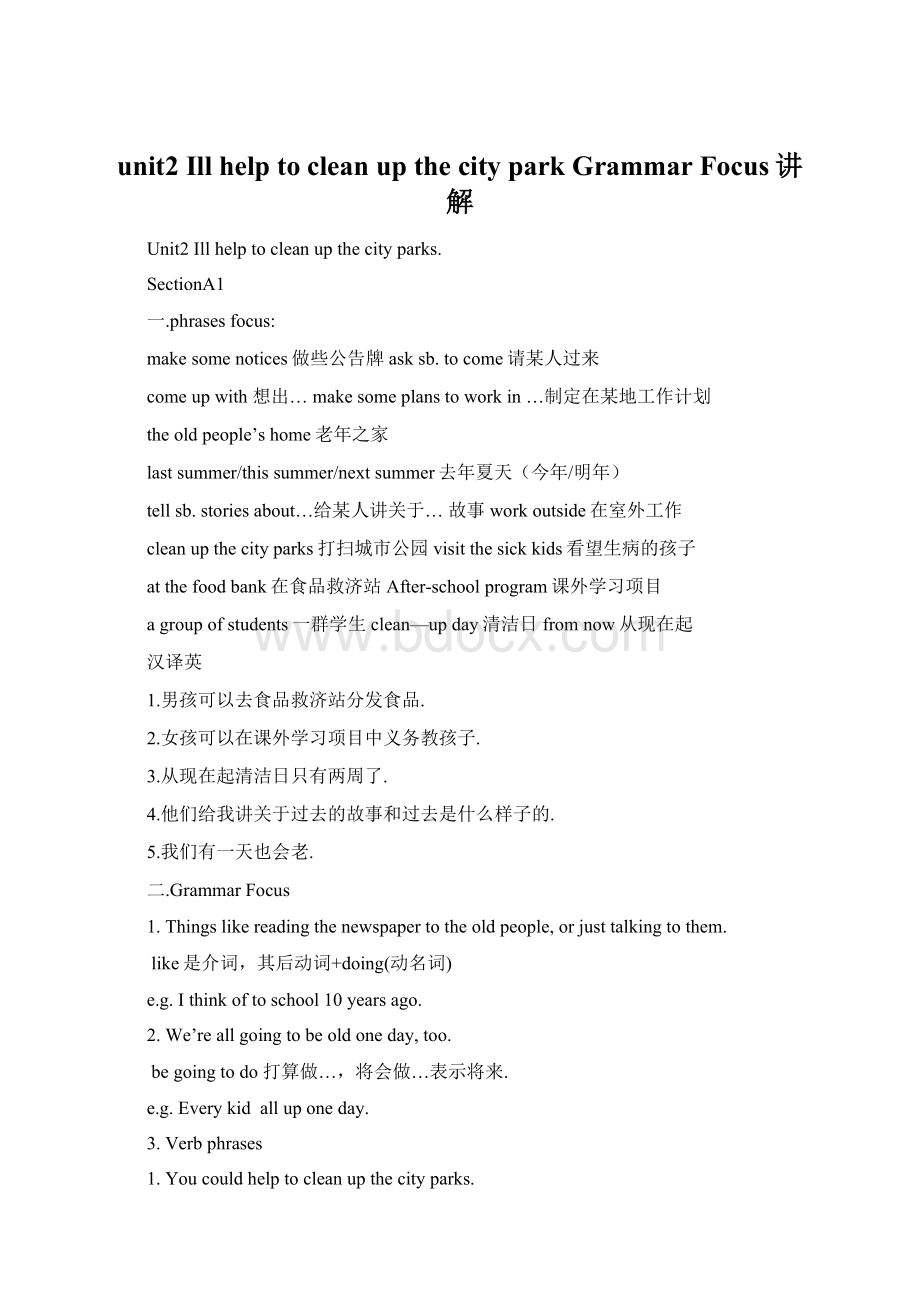unit2 Ill help to clean up the city park Grammar Focus讲解Word文档格式.docx
《unit2 Ill help to clean up the city park Grammar Focus讲解Word文档格式.docx》由会员分享,可在线阅读,更多相关《unit2 Ill help to clean up the city park Grammar Focus讲解Word文档格式.docx(17页珍藏版)》请在冰豆网上搜索。

让我用一下你的钢笔好吗?
B.clean(+pron.)up+n.收拾干净,打扫
clean-upn.清洁
1).Youshouldalwayscleanuptheroom.你应该经常打扫房间
2).Let'
sstartinandcleanupthekitchen.
咱们开始打扫厨房吧。
cleanaway除去.cleanout把(某物)腾空,清除
2.…visitthesickkidsinthehospitaltocheerthemup.
cheer(pron.)up+n.使…高兴起来
1).WhatshouldIdotocheermysisterup?
=WhatshouldIdotocheerupmysister?
我该怎样做才能使我的姐姐高兴起来呢?
2).Thenewscheeredhimup.这消息使他高兴了起来
cheerup还可意为“振作起来”。
3).Cheerup!
Ourtroubleswillsoonbeover.振作起来!
我们的困难很快就会过去。
Carefor/lookafter/takecareof照顾
noticen.公告v.注意到:
noticethat/noticesb.dosth.(doingsth.)
cheeron为……打气,激励……,向……喝彩
4).Shedidherbesttocheerhimonwhenhewasabouttogiveup.当他快要放弃时,她尽力鼓励他。
Comeupwith想起Comeoverto顺便拜访ComeinComeup走近
Comeout开花,出版Comeon意为“快,加油,加把劲”
1).Comeon!
Tryoncemore.加把劲!
再试一次。
3.Theboycouldgiveoutfoodatthefoodbank.
giveout分发(这句话里相当于handout)
1).Theteachergaveouttheexaminationpaperstenminutesago.老师十分钟前发放了考试卷。
giveout还可以意为“用完,停止运行,发出(热heat、光light、声音sound、气味smell等)”.
1).Herpatiencefinallygaveout.她终于失去耐心了。
2).Theradiatorisgivingoutalotofheat.散热器散发着大量的热。
giveup放弃giveoff发出;
放出givein屈服giveaway赠送、分发
4.Thegirlcouldvolunteerinan….
volunteerv.义务做;
自愿做
1).Manypeoplevolunteertoworkonthefarms.许多人自愿到农场劳动。
2).Hevolunteeredtowaterourplants.他主动提出给我们的树木浇水。
volunteern.志愿者
3).Hewantstobeavolunteertohelpothers.他想要成为一名志愿者去帮助别人。
volunteertodosth.“自愿做某事”,
5.Wecan’tputoffmakingaplan.
putoff推迟;
拖延
1).Neverputofftilltomorrowwhatyoucandotoday.今日事今日毕。
2).Thegamewasputoffbecauseofrain.比赛因雨延期。
6.Wecouldputupsigns.
putup张贴,搭建
1).He
putup
aposteradvertisingthecircus.
他贴了一张宣传马戏团的海报。
2).Beforeitgotdark,they
theirtentinafield.
天黑前,他们在地里搭起了帐篷。
Puton表演;
穿上putoff推迟;
延期putback放回原处
Putout熄灭;
发表putforward提出Putdown镇压;
记下
putaway收拾;
放好;
储存;
吃;
放弃
7.Weneedtocomeupwithaplanfor….
comeupwith(针对问题等)提出(观点),想出(办法)
1).Ihopeyoucancomeupwithabetterplanthanthis.
我希望你能提出比这更好的计划来。
catchupwith追上;
赶上putupwith忍受
keepupwith跟上,不落在…后面endupwith以......结束
8.Theytoldmestoriesaboutthepastandhowthingsusedtobe.
usedto“过去常常…”,用于表示过去的状态或过去的习惯性动作。
1).Heusedtogetupearly.他过去常常起床很早。
2).Theriverusedtobeclean.这条河过去很干净。
beusedtodoing习惯于做…usesthtodo…用…来做…..
1).Helikedcollectingstampsinthepast.(改为同义句)
He______________collectingstamps.
2).Therewasabigstoneinthemiddleoftheroad.(用usedto改写句子)
_______________abigstoneinthemiddleoftheroad.
9.Yeah,alotofpeoplearelonely.
lonelyadj.寂寞的,孤独的,荒凉的,偏僻的(心理)既可作定语也可作表语
1).Shefeltlonelyandsickforherparents.她感到孤独,十分想念她的父母。
2).That’salonelyisland.那是一个荒凉的岛屿。
aloneadj.单独的;
独自的(形体)
3).ThoughJohnwasnotalone,hewaslonely.
虽然约翰并不是独自一个人,他却感觉寂寞。
alone是表语形容词,因此能说Themanisalone,不能说analoneman,也不能说veryalone。
此外,alone也可做副词,用于动词之后。
1).Bytheway,doyoufeel_______whenyouare______?
A.alone,lonelyB.lonely,alone
C.alone,aloneD.lonely,lonely
2).Theoldmanlives_____ina______house,butheneverfeels_______.
A.alone,lonely,lonely
B.alone,alone,lonely
C.lonely,lonely,alone
D.alone,alone,alone
SectionA2
一.PhrasesFocus.
giveup放弃severalhourseveryweek每周几小时
wanttobeananimaldoctor相当动物医生thelookofjoy喜悦的表情
getone’sdreamjob找到某人梦想职业
getastrongfeelingofsatisfaction获得强烈的满足感
booklover书爱好者(登山爱好者)readbyoneself靠自己阅读
attheageof在…岁的时候tryoutfor参加…的选拔
journeywith伴随…的旅程atthesametime同时
1.我能做我爱做的事情,同时还能帮助别人。
2.爱丽丝热爱动物,想当植物医生。
3.它能帮她找到未来梦想的职业。
4.我想学会关于如何照料老人。
5.在玛丽5岁时就能够独自阅读。
6.他决定参加课外阅读项目志愿者的选拔。
二.GrammarFocus.
1.MarioGreenandMaryBrownfromRiversideHighSchoolgiveupseveralhourseachweektohelpothers.
A.fromRiversideHighSchool是介词短语,做MarioGreenandMaryBrown的后置定语,翻译时要把意思放前面:
来自滨江中学的格林.马瑞奥和玛丽.
B.tohelpothers是动词不定式,是前面动作giveupseveralhourseachweek目的,在全句中这里做目的状语。
2.Studentswhovolunteer.
Notice:
whovolunteer是个定语从句,修饰student,翻译时意思放前,做志愿者的学生。
3.Mariobelievesitcanhelphimtogethisfuturedreamjob.这是一个宾语从句,做动词belives的宾语.
1).Butyoucanseeintheireyesthatthey‘regoingonadifferentjourneywitheachnewbook(宾语从句).
在他们的眼里你能看到伴每一本新书随着他们走向不同的旅程。
4.Volunteeringhereisadreamcometrueforme.对我来说,这里做志愿者是美梦成真.
A.这是动名词Volunteeringhere(v+ing.)作句子的主语,B.后面是一个表语从句(一个句子作表语).
5.verbphrases
1.Igetsuchastrongfeelingofsatisfaction…
getv.产生;
形成常与feeling,idea等词搭配使用。
1).Doyougetthefeelingthatwe’renotwelcomehere?
你有这里不欢迎我们的感觉吗?
2).Howdidyougetsuchanidea?
你怎么会产生这样一个想法?
getbetter…
get在这里用作系动词,“变得,变为”;
后接形容词,表示体质、情绪、天气等方面的改变。
1).Hegotangrywithmeafterthat.那之后他生我的气了。
2).It’sgettinghotternow.现在天气变得热起来了。
2.Shecouldreadbyherselfattheageoffour.
“by+反身代词”表示“独自地;
独立地”
1).Childrenshouldlearntodothingsbythemselves.孩子们应当学习独立做事。
2).climbbyhimself(unit1)
Howtocareforanimals.
疑问代词、副词+to+do(v).有:
what/who/which/where/when/whytodo.
WhytogoHainan.Whentodoyourhomework
Whichwaytogowhattodohowtodoit
1).DoeshelearnEnglish____himself?
byoneself,foroneself,tooneself,ofoneself之辨析
这四个介词短语均属“介词+反身代词”结构,在句中作状语
byoneself表示“独自,独立地”的意思,相当于alone;
foroneself一般表示“为自己”的意思;
tooneself含有“暗自(在心中)”的意思,常与动词think,say,talk,tell等连用;
ofoneself意思是“自然地、自发地、自动地”
Several.
Adj.少数,几个人。
1).Severalstudentdecidedtogoshoppingjustnow.
Pron.几个,数个。
2).Severalwenttothecinemayesterday.
Own
Adj.自己的.
1).Maryhasherownstudyandlife.
v.拥有.
2).Everyoneallownfreetime.Youshouldloveit.
3).keephealthy,Idecide___________(exercise)halfanhoureveryday.
tryoutfor报名参加…;
参加…选拔
1).Shirleywilltryoutfortheleadintheplay.
雪莉将参加该剧主角的选拔演出。
2).Overfiftyboyscameto
try
out
for
thefootballteam.
五十多个男孩来竞争参加足球队。
tryout试用,试验
3).Mybrotherwantsto
____________
tryon试穿;
试戴tryout试验;
试用tryfor/after谋求;
争取
4).When
I
tried
the
coat
on,
found
it
was
too
big
me.
trytodo努力做
trydoing尝试做
1).Let'
s
tryout
yourmethod.Itseemsverygood.
我们来试试你的办法,看来这办法不错。
2).Hesaidhewasgoingto
firstplacenextyear.
他说他打算明年争取夺得第一名。
goon举行,进行,去(goonapicnic/trip/journey长途旅行)
3).Iwouldliketo
_________
thenewwork.
Satisfyv.使…满意.
Tomsatisfiedhisfatherlastyear.
Satisfactionn.满意.Toonessatisfaction使…满意的是….
4.Volunteeringhereisadreamcometrueforme.
Volunteeringhere在句中作主语。
动名词可放在句首可作主语。
如:
1).Readingisanart.读书是一种艺术。
2).Swimmingismyfavoritesport.游泳是我最爱的运动。
A3
一.phrasesFocus:
bebusydoingsth.忙于做某事volunteeronestimetodosth.志愿用时间做
primaryschool小学aroundtheschool学校周围
booksale售书homelesspeople无家可归的人们
beworriedaboutsth.为…担忧getgoodjob找到好工作
makemoney挣钱lessluckythan不比…幸运
stopdoingonesjobtodosth.离职做…atleast至少
raisemoneyforsth.为…筹钱
二.GrammarFocus:
一.Usecouldforsuggestions
could是情态动词can的过去式,但常用来表示委婉的语气,此时与过去式无关,语气比can更委婉。
可以用来表示建议或劝告,意为“可以;
不妨”。
1).Thegirlcouldvisitthesickkidsinthehospitaltocheerthemup.
2).Theboycouldgiveoutfoodatthefoodbank.
3).Thegirlcouldvolunteerinanafter-schoolstudyprogramtoteachkids.
4).Theboycouldhelptocleanupthecityparks
5).---Couldyouletmehaveyourpassport?
---Yes,hereitis.
could表示“能力”或“可能性”,作为can的过去形式。
1).CouldyouspeakEnglishthen?
那时你能讲英语吗?
二.短语动词Phrasalverbs
短语动词是指英语中有些动词和其他词类一起连用,构成一个固定词组,可看成一个整体,相当于一个单独的动词,这种组合称之为短语动词。
短语动词的构成基本有下列几种:
1.★动词+介词
此类短语动词可以用作及物动词,后面必须接宾语。
1).Lookattheblackboard,please!
请看黑板!
此类短语动词还有listento,dependon/upon,lookfor,dealwith,lookafter,takeafter,waitfor等。
2.★动词+副词
此类短语动词既可以用作及物动词,也可以用作不及物动词。
1).Igetupveryearlyeverymorning.我每天早晨都很早起床。
2).Canyouworkoutthisproblem?
你能做出这道题吗?
当此类短语动词用作及物动词时,如果宾语是名词,可以将其放在短语的后面,也可以放在动词和副词之间;
如果宾语是代词,则必须将其放在动词和副词之间。
1).Heputonhisclothesquickly.=Heputhisclothesonquickly.
他快速地穿上了衣服。
2).Pleasewakemeupatfivetomorrowmorning.请明天早晨五点钟叫醒我。
cleanup,cheerup,giveout,eatup,fixup,giveup,giveaway,handout,helpout,putoff,putup,takeoff等
3.★动词+副词+介词
此类短语动词可以用作及物动词。
1).We’rerunningoutofwater.我们的水快用光了。
此类短语动词还有comeupwith,dowellin,lookforwardto,lookdownupon,lookoutof,putupwith等。
4.★动词+名词+介词
此类短语动词的意义取决于名词,而不是动词,修饰时不用副词而用形容词。
1).Weshouldtakegoodcareofourparents.我们应该好好照顾我们的父母。
此类短语动词还有makeuseof,takepridein,makefriendswith,payattentionto等。
三.动词不定式Infinitive
1.什么是动词不定式?
主要行为动词后面的动词采用“to+动词原形”的结构,我们把这种结构称为动词不定式(有时可以不带to)。
动词不定式没有人称和数的变化,在句子中不能作谓语。
下面我们一起来看一下动词不定式有哪些语法功能。
2.动词不定式的主要语法